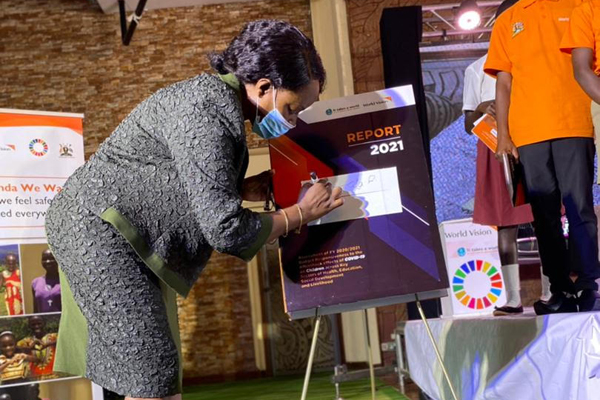Children activities are poorly funded- Minister Nakiwala

This photo taken on April 20, 2021 shows Minister of State for Children and Youth Affairs in the Ministry of Gender Labour and Social Development, Ms Florence Nakiwala Kiyingi signing on the report on budget responsiveness to the aftershock effects of Covid-19 on children. PHOTO/ ROLAND NASASIRA
What you need to know:
- Justice Baraka, a 12-year old primary seven vacist of Greens Primary School and child rights advocate in Busia district concluded the symposium, noting that the best gift anyone can have is children and that the best gift anyone can give their child is loving them.
The Minister of State for Children and Youth Affairs in the Ministry of Gender Labour and Social Development, Ms Florence Nakiwala Kiyingi has decried government’s poor funding towards children activities, welfare and improvement.
“If we are to emerge and move on from the effects of the pandemic (Covid-19), we must be deliberate on and be intentional about the welfare of the child. When we (Ministry of Gender Labour and Social development) thought we would be given money for street children, the finance ministry did not allocate us money as approved by Parliament. We were quite disappointed and the process of ensuring that children are off the streets stalled. Even then, we are backstage ensuring that the local government’s budget for children activities in the next financial year is well taken care of,” Nakiwala said.
She made the remarks while presiding over a children’s Sustainable Development Goals (SDG) symposium at Golf Course Hotel in Kampala today, where a report on budget responsiveness to the aftershock effects of Covid-19 on children across key sectors of health, education, social development and livelihood that was prepared by World Vision Uganda was also launched.
The Minister also observed that the purpose of the report was to look at the direct investment into the child.
“Any nation is seen through the way it treats its children and there is no doubt about it. We are building the next generation. There should be a symbiotic relationship between what we are doing and the future we want for our country,” Nakiwala added.
At the same meeting, the United Nations Resident Coordinator Ms Rosa Malango noted that children are not only the most vulnerable citizens in any society but also the greatest of all treasures any nation can have. It should be noted that Uganda is the world’s second youngest nation, with 70 percent of its population under the age of 30, and half of the population as children under the age of 18.
“If Uganda is to achieve a more sustainable future and become a modern society by 2040, it is imperative to protect, nurture and empower children regardless of their gender, religion, ethnicity or social status,” Malango said.
The SDGs, Ms Malango explained, represent unprecedented agreement among the 193 United Nations member states, to which Uganda is signatory, to pursue global aspirations, taking into account the different national realities and encouraging partnerships across society and pursue prosperity and peace that does not destroy the environment and leave anyone, particularly children, behind.
“We cannot transform the world and achieve the SDGs without achieving SDG four of quality education whose focus is to ensure inclusive and equitable quality education and promote life learning opportunities for all. Tomorrow’s leaders (children) must be well educated to achieve their full potential and their development must be holistic, intellectual, spiritual, physical and emotional,” Ms Malango added.
Organised under the theme “The place of Children in SDG implementation and monitoring: Leaving no one behind during and post-Covid-19,” the symposium came at a time when the world is trying to overcome the short-term and long-term impacts of Covid-19 on many, if not all countries, Uganda inclusive.
“Placing children at the center of planning, implementation and accountability processes is one of the sure ways we can give life to the dreams of many children out there. Building back stronger from the Covid-19 pandemic will require a stronger focus on sustainable and inclusive development. This is only possible when we intentionally invest in our children,” said Jason Evans, the National Director of World Vision Uganda.
Much as government created awareness to parents to be responsible with their children during the Covid-19 induced lockdown within the confines of their home, the problem was that there were child right’s abusers within the same home confines, something that increased violence against children cases especially teenage pregnancies and child marriages that were already high even before the break out of Covid-19.
According to the Assistant Commissioner Youth and Children in the Ministry of Gender Labour and Social development, Mondo Kyateka, Covid-19 was a litmus test that parents are not as good as the ministry thought they were in terms of looking after their children. He says there is a number of internally displaced parents who never have time for their children.
“Children are still in danger of predators of people they call uncles and aunts. You need to be parents once again. Parenting is about nurturing, protecting, loving and ensuring that nothing happens to the person you love especially children. You should be there as the guarantor of peace and tranquillity within a home,” Kyateka advised.
Justice Baraka, a 12-year old primary seven vacist of Greens Primary School and child rights advocate in Busia district concluded the symposium, noting that the best gift anyone can have is children and that the best gift anyone can give their child is loving them.
Baraka also urged government and other stakeholders to involve children in the planning processes and seek their opinions about certain aspects because they (children) know better what their needs are compared to parents and the government who in most cases make need assumptions for children.



